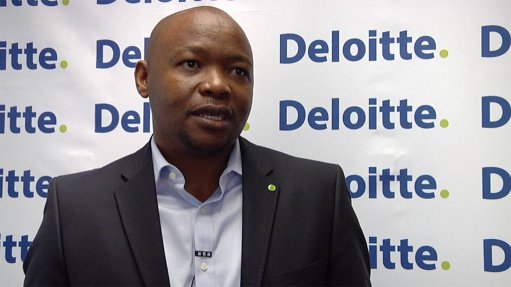
Deloitte business tax director Alex Gwala
JOHANNESBURG (miningweekly.com) – Finance Minister Pravin Gordhan is likely to raise the issue of imposing an environmental tax on the mining sector in his 2016/17 budget speech on February 24, predicts Deloitte business tax director Alex Gwala.
The introduction of these taxes was mentioned in last year’s budget speech, though nothing had come to fruition since. The tax was aimed at complementing the government’s current efforts to quell continuing acid mine drainage (AMD) expenses, while ensuring that the mining sector would also make a fair contribution to the issue.
Speaking to Mining Weekly Online, Gwala noted that the current bill for treating AMD stood at R3.6-billion a year and, if implemented, the environmental tax would not make a significant dent in the mining industry’s bottom line.
The Davis Tax Committee, which assesed South Africa’s tax policy framework under the auspices of Judge Dennis Davis, was also in favour of environmental taxes on South Africa’s mining industry, owing to the seriousness of AMD and the importance of an appropriate joint governmental strategy to deal comprehensively with the problem.
“In light of the current scarcity of water, it is likely that Minister Gordhan may pick up on this matter in his upcoming budget speech,” added Gwala.
OIL & GAS TAXES
Deloitte tax partner Anthea Scholtz said in a statement that, as oil and gas companies and oilfield services companies continued to contribute to the increased levels of activity in the sector, the country should also continue its efforts to encourage investment in this industry.
However, she highlighted that there have been some recent amendments to the Tenth Schedule provisions, a favourable tax regime in the South African Income Tax Act for oil and gas companies.
In light of these “relatively new and various amendments”, effected to ensure that oil and gas companies benefit in the manner intended by the tax rules, Scholtz noted that some clarification would need to be provided during the budget speech.
This included clarity on the 200% super tax deduction permitted for expenditure of a capital nature, as it was not clear which type of costs benefit from these tax deductions.
Clarification was also needed on the mechanism under which an oil and gas company could enter into a royalty fiscal stability agreement, as well as what comprised international traffic for tax exemption purposes when it came to personal tax.
“An incentive regime would also be welcomed for the oilfield services industry to stimulate further growth,” she noted.
Scholtz added that no major changes were expected to the tax legislation governing oil and gas companies for the foreseeable future.